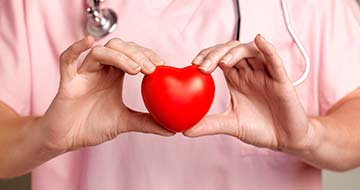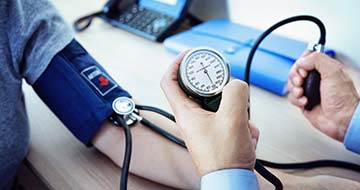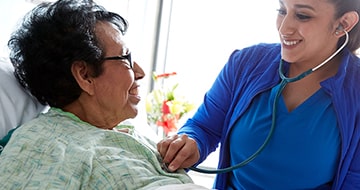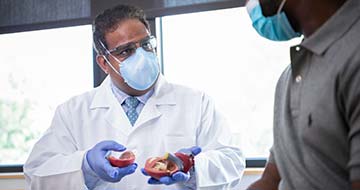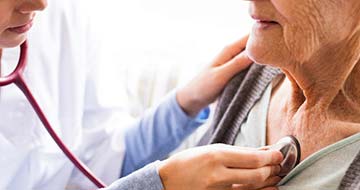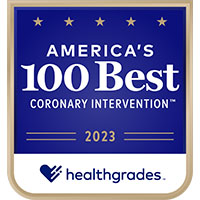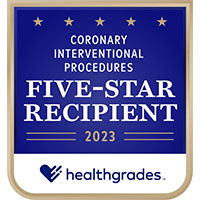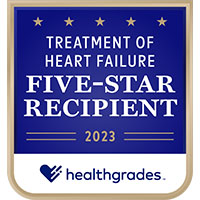Nearly half of the adult population in the United States has cardiovascular disease. Cardiovascular disease refers to several conditions, such as heart disease, heart attack, stroke, heart failure, arrhythmia and heart valve problems.
At Saint
Vincent Hospital, we offer advanced heart and vascular care using a multidisciplinary approach, so you get the full benefit of care in a variety of subspecialties. We have been keeping hearts healthy for communities in Central Massachusetts for more
than four decades.
Whether you need emergency cardiac care, a vascular procedure or ongoing preventive care, our cardiac and vascular services can help.
Let us help you stay on top of your heart health with the multidisciplinary
cardiovascular care available at Saint Vincent Hospital:
Learn more about Saint Vincent Hospital's comprehensive cardiovascular services here.
Cardiovascular Disease vs. Heart Disease
The cardiovascular or circulatory system consists of the heart, blood and blood vessels. Cardiovascular disease is an umbrella term for all types of disease that affect the heart or blood vessels, while heart disease is a condition that affects the heart's
structure and function.
What Does a Cardiologist Do?
Cardiologists are doctors who diagnose, assess and treat various diseases that affect the cardiovascular system. They also promote heart-healthy habits and disease prevention. Many cardiologists choose to focus on specific fields, such as the following:
- Interventional cardiology
- Adult congenital heart disease
- Cardiac imaging
- Electrophysiology including ablation
- Electrical device therapy
- Heart failure, including cardiac transplantation and support devices
A cardiologist is not the same as a cardiac surgeon. A cardiologist diagnoses, assesses and treats patients with cardiovascular system disorders, supervises all therapy aspects and administers drugs. A cardiac surgeon performs traditional open-heart surgery
or minimally invasive heart surgery.
What to Expect at a Cardiologist Appointment?
Imaging tests to diagnose, monitor or treat cardiovascular diseases include:
- Cardiac CT
- Cardiac MRI
- Coronary angiography
- CT angiography (CTA) and magnetic resonance angiography (MRA)
- Echocardiogram
- PET scan of the heart
- Stress tests
- Vascular ultrasound such as carotid ultrasound
- Venous ultrasound of the arms and legs
How Do You Know If You Have Heart Problems?
The warning signs of heart disease may not be evident until it's too late. That's because heart disease often develops over time. You may not realize it, but you may be developing heart disease or have early signs or symptoms long before you have serious
heart problems.
The following are some of the warning signs and symptoms to watch out for:
- Chest pain - characterized as a sharp and burning pain in your chest, including pain under your breastbone or in your neck, arms, stomach, jaw or upper back.
- Shortness of breath - occurs when the heart can't pump blood as well as it should, causing blood to back up in the veins that go from the lungs to the heart. The fluid then leaks into the lungs and causes shortness of breath, which may happen
during activity, while you're resting and when you're lying flat on your back.
- Coughing or wheezing - occurs when fluid starts to build up in your lungs. You may also cough up mucus that is pink or bloody.
- Swelling in the legs, ankles or feet - occurs when your heart doesn't work as it should, and blood flow slows down and backs up in the veins in your legs. Swelling, also called edema, may also occur in your stomach.
- Narrowed blood vessels – may occur when cholesterol and other fatty material (plaque) build up on the walls of your arteries
- Fatigue – may be a sign of a heart problem when you feel much more tired than normal, you feel tired that you can't perform daily activities or you have sudden and severe weakness
- Fast or uneven heartbeat – arrhythmia occurs when the heart beats too fast, too slowly or with an irregular rhythm. When left untreated, the heart may not pump enough blood to the body, which may cause damage or shut down the heart, lungs,
brain and all other organs leading to life-threatening complications, such as heart failure, stroke or sudden cardiac arrest.
If you are experiencing symptoms of heart disease, seek medical help immediately.
What Is Emergency Cardiac Care?
According to the American Heart Association, emergency cardiac care reduces disability and death from complications affecting the cardiovascular and pulmonary systems through basic and advanced life support.
What Is a Cardiac Hospital?
Cardiac care hospitals specialize in providing comprehensive care to people with heart-related issues, such as heart attack, arrhythmia, cardiomyopathy, unstable angina or heart infection. Cardiac care units also manage complications that result from
heart disease, including kidney failure, respiratory failure, sepsis and infection.
Find a Cardiologist in Worcester
Your heart health can't wait. Help is on the way through our experienced cardiologists and compassionate staff at Saint Vincent Hospital. Our goal is to help you get the quality care you deserve through compassionate service combined with our facility's
advanced technology and procedures. Please speak with one of our cardiologists to learn more about your condition and treatment options. To schedule an appointment, please fill out this form or call 844-367-0413.
Whether you need emergency cardiac care, preventative care or a vascular procedure, we are here to help. We also provide cardiac rehabilitation to help you recover after a procedure.
Insurance Accepted
At Saint Vincent Hospital, we want to help make it possible to give you the care you need when you need it the most. Our dedicated staff will be ready to assist you with questions about billing and insurance coverage. We accept a variety of insurance
plans and offer payment plan flexibility. Watch this video to learn more about our extended payment plans. For questions about your coverage, please contact your insurance provider directly or check out our financial resources page for more information.
If you are experiencing pain or discomfort from an undiagnosed condition or injury, visit us at Saint Vincent Hospital for proper diagnosis and advice on the best treatment options for your situation. If it's an emergency, please call 911 or go to the
nearest emergency room.

